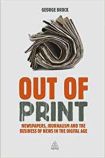Out of Print: Newspapers, Journalism and the Business of News in the Digital Age by George Brock
| Out of Print: Newspapers, Journalism and the Business of News in the Digital Age by George Brock | |
|
| |
| Category: Politics and Society | |
| Reviewer: Sue Magee | |
| Summary: A snapshot view of the state of the news industry at the moment, how it got there and where it might go. It's particularly interesting on the possibilities for the future. | |
| Buy? Maybe | Borrow? Yes |
| Pages: 256 | Date: September 2013 |
| Publisher: Kogan Page | |
| External links: [http@//www.georgebrock.net Author's website] | |
| ISBN: 978-0749466510 | |
|
| |
At about the turn of the century most people on the street where I live had a morning paper delivered and a good number also got an evening paper. The queue at the newsagent in the village would be out of the door each morning as people picked up a paper on their way to work. I can't remember when I last saw a newspaper boy (or girl) on their rounds and we only buy the weekend papers as an indulgence with a more leisurely breakfast. Times have changed - and there's no sign that the situation is likely to settle in the near future.
In Out of Print George Brock looks at how the news industry arrived at where it is now, the realities of the present situation and the possibilities and probabilities for the future. Brock is Professor and Head of Journalism at City University as well as having been a working journalist for many years and there's no doubt that he has his finger on the pulse of the industry. He's particularly good at analysing the changes which have taken place, such as digital technology, and showing that they should force a complete rethink of journalism rather than attempts to adapt old ways to fit new technology. The chapter on Rethinking Journalism Again is a thought-provoking look at what is changing and how it should be regarded both within the industry and as a consumer.
I found the historical chapters a little excessive - I'd happily have done without the first two chapters and settled for bringing me up to date from about the nineteen sixties. Brock calls the second half of the twentieth century The Gilded Age but qualifies this by adding that it's ironic. This might have looked like a period of influence and achievement but the reality was that the signs of decline were evident long before the internet was even a dream.
The book comes into its own with the chapter The Business Model Crumbles. Historically, print papers have been cross-subsidised, usually by advertising and we're now in the unusual situation whereby some newspapers find that it's more profitable to give the physical paper away than to charge for it - with the paper's real asset being the right to distribute in certain locations. So far as online news media is concerned the effect of paywalls (or meters) is informative. A paywall is really only going to work when the information (or something very similar) can't be had for free. Loyalty doesn't come into play when wallets have to be opened.
It's not just the business models which have crumbled either - credibility has drained away, even from institutions such as the BBC. Brock wisely avoids getting too deeply into the mire of Savile and phone hacking and gives a brisk summary of the situation and how it has affected the industry. He approaches the Leveson Inquiry in a similar manner but does seem to feel that it was a missed opportunity in that he should have considered a 'law first' approach rather than dashing to the idea of regulation. I'd have welcomed a lot more discussion on this point, but that could well be because it agrees with my own view.
A snapshot of the industry at a particular moment in time can quickly be out of date, but Brock is good on where the industry might go next - and his final chapters are particularly far reaching and thought-provoking. Most importantly though - many if the changes he envisages will not be unwelcome.
I'd like to thank the publishers for sending a copy to the Bookbag.
For a look at how changes are affecting the publishing industry we can recommend Merchants of Culture: The Publishing Business in the Twenty-First Century by John B Thompson. For more about newspapers, have a look at There Is No Such Thing As A Free Press by Mick Hume.
Please share on: ![]() Facebook,
Facebook, ![]() Twitter and
Twitter and
![]() Instagram
Instagram
![]() You can read more book reviews or buy Out of Print: Newspapers, Journalism and the Business of News in the Digital Age by George Brock at Amazon.co.uk Amazon currently charges £2.99 for standard delivery for orders under £20, over which delivery is free.
You can read more book reviews or buy Out of Print: Newspapers, Journalism and the Business of News in the Digital Age by George Brock at Amazon.co.uk Amazon currently charges £2.99 for standard delivery for orders under £20, over which delivery is free.
![]() You can read more book reviews or buy Out of Print: Newspapers, Journalism and the Business of News in the Digital Age by George Brock at Amazon.com.
You can read more book reviews or buy Out of Print: Newspapers, Journalism and the Business of News in the Digital Age by George Brock at Amazon.com.
Comments
Like to comment on this review?
Just send us an email and we'll put the best up on the site.


